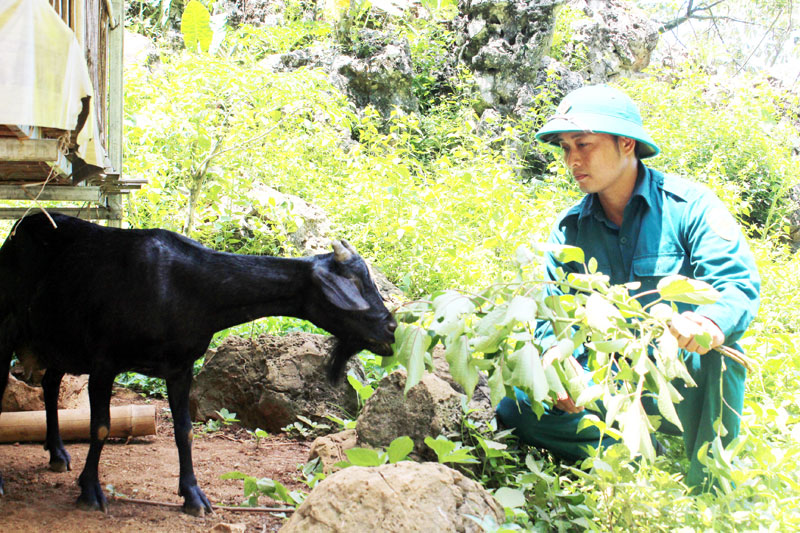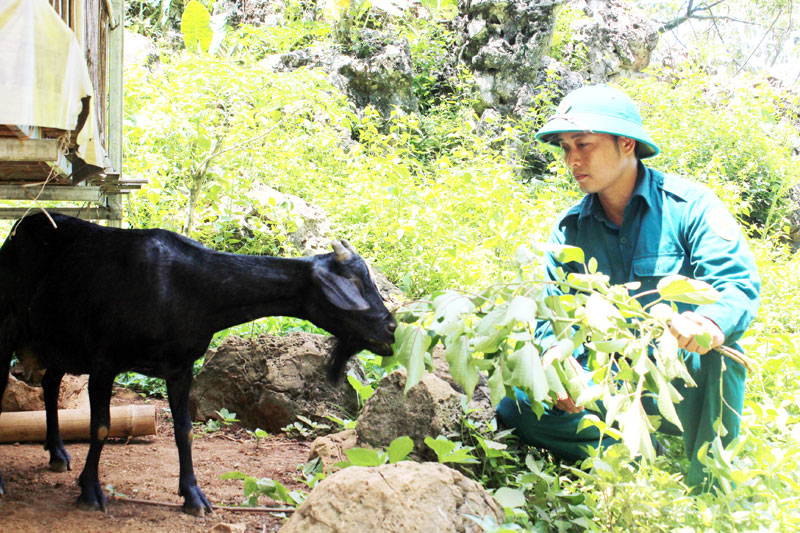
(HBO) - Not only accomplishing excellently his political tasks every year, but the militia soldier Mr. Bui Van Phuong, Cao Ram Commune (Luong Son) is also a good example in the movement of military soldier doing start-up with the model of raising mountainous goats.

Mr. Bui Van Phuong, a militia soldier in Cao
Ram Commune (Luong Son), takes care of his family's goats.
In 2002, after graduation, Mr. Phuong found
that, the economy would not be improved with the farming on the garden and in
the field. With his desire to get rich in the homeland, in 2006, Phuong boldly
borrowed a loan to develop livestock growing. However, with limited borrowings
and less experience, he failed. His dream of enrichment was unfinished; Mr.
Phuong chose to go to work far away to live on. In 2011, Phuong came back and
continued to try on livestock development. Seeing that Sang Mountain behind his
house had great potential to develop goat rising, Mr. Phuong bought goat
breeding for rising. At first, the goats just grazed around the village, but
the grazing area is increasingly narrowed, so the goats went to the local
people’s garden and destroyed their vegetables. He was so concerned and
thoughtful about that. Then, he realized that the valley on the mountain was
the ideal pasture for goats. After that, he came up with the idea of building
a bridge for the goats to go across the mountain. More than 40 meters of stairs
built up made a breakthrough for him to grow goats. Up to now, Mr. Phuong's
family has maintained a group of 50 goats. Along with that, he converted 1.5
hectares of paddy rice to turmeric growing, combined with livestock and poultry
raising. As a result, every year, except for expenses, the economic model of
his family brings in stable income with an average of 150 million VND per year.
"While I was doing, I was learning and
actively looking for effective production and business models for learning
experiences, especially the models that militiamen have been developing
effectively with high economic efficiency, exploiting well the potential and
advantages of the local. From that, I could apply to the economic model of my
family".Mr. Phuong shared.
Not only doing good economics, Mr. Phuong is
also an example of militia soldiers, completing excellent training duties. Every
year, he actively participates in trainings, contests, workshops and
examinations organized by Commune Military Management Board. His achievements
are very impressive with 100% of the courses and the test items to be quite
good, as good as shooting, tactics, testing political awareness.
According to data from the Hoa Binh Provincial Party Committee, the industrial production index for the first six months of 2025 is estimated to have increased by 20% compared to the same period last year. This marks the highest year-on-year growth rate for this period since 2020.
In the first six months of 2025, Hoa Binh province’s export turnover was estimated at 1.145 billion USD, marking an 18.11% increase compared to the same period in 2024. Import turnover was estimated at $ 804 million, a 17.15% increase, which helped the province maintain a positive trade balance.
The lives of the ethnic minority farmers in Tan Lac district have gradually improved thanks to the new directions in agricultural production. This is a testament to the collective strength fostered through the professional associations and groups implemented by various levels of the district’s Farmers’ Union.
With the motto the "product quality comes first,” after nearly one year of establishment and operation, Muong village’s Clean Food Agricultural and Commercial Cooperative, located in Cau Hamlet, Hung Son Commune (Kim Boi district), has launched reputable, high-quality agricultural products to the market that are well-received by consumers. The products such as Muong village’s pork sausage, salt-cured chicken, and salt-cured pork hocks have gradually carved out a place in the market and they are on the path to obtaining the OCOP certification.
In the past, the phrase "bumper harvest, rock-bottom prices" was a familiar refrain for Vietnamese farmers engaged in fragmented, small-scale agriculture. But today, a new spirit is emerging across rural areas of Hoa Binh province - one of collaboration, organisation, and collective economic models that provide a stable foundation for production.
Maintaining growing area codes and packing facility codes in accordance with regulations is a mandatory requirement for agricultural products to be eligible for export. Recently, the Department of Agriculture and Environment of Hoa Binh province has intensified technical supervision of designated farming areas and packing facilities to safeguard the "green passport" that enables its products to access international markets.



